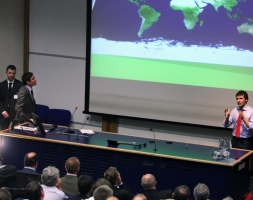Dragons’ Den style competition showcases student entrepreneurship

Four teams competed for £20,000 development money in a competition organised by the Chemical Biology Centre - News
Friday 2 July 2010
By John-Paul Jones
See also:
Related New Stories
Four teams of Imperial PhD students competed for £20,000 business development money in a Dragons’ Den style competition this week, digitally compered by Evan Davis, host of the BBC programme Dragons’ Den.
DTC (Doctoral Training Centre) Den 2010 saw three teams from the College’s Chemical Biology Centre and one from RASOR, a sister research consortium based in Scotland, pitch their ideas to a panel of experts including the chief executives of three major research councils.
The competition culminated in a live grand final on Wednesday, in which an Imperial team called ‘anywhere HPLC’ claimed victory with their proposal, a handheld, disposable device which connects to a smart phone, allowing researchers to analyse mixtures, such as groundwater or blood, anywhere for instant results, removing the need to transport samples back to laboratories. Imperial Innovations, the College’s part-owned technology commercialisation company, will provide support as well as the prize money for developing the concept.
Winners Duncan Casey, Ali Salehi-Reyhani and Joseph Kaplinsky, all postgraduates in the Chemical Biology Centre Doctoral Training Centre (CBC DTC), won out against stiff competition, according to the panel of five judges. One, Sir Leszek Borysiewicz, the Chief Executive of the Medical Research Council (MRC), and former Deputy Rector of Imperial, said:

“I thought this was a remarkable event. The teams showed ingenuity and immense application of research to the themes that they took forward, as well as careful consideration of the business case. It’s a credit to all of them in terms of how far they’ve been able to take their ideas in these early stages.”
Claiming an iPad each, were runners up Natalia Goehring and Marie Kirsten, also from the CBC DTC, for their concept for tailoring microplates. Scientists use microplates to study samples, such as human tissue in drug development research, and the students’ design allow researchers to analyse the interactions between different samples on a microplate simultaneously more easily.
Whittled down from 10 participating teams, the four finalists received guidance in entrepreneurship from Imperial College Business School and intellectual property patenting advice from Imperial Innovations to refine their pitches. Organiser, Dr Oscar Ces, said that this was an important aspect of the competition’s credibility:

Team 'anywhere HPLC' giving their pitch
“We wanted to encourage entrepreneurial skills in the students and thought the best way was to offer development money to the winners, allowing them to realise the commercial potential of their ideas. A Dragon’s Den style event seemed an ideal way to do that.”
Evan Davis spent an afternoon at Imperial earlier in the month, meeting the teams and recording the footage for the final. He said:
“I live quite close to Imperial College and its obviously an institution that we’ve all learned to admire very greatly, so when someone from Imperial called me and asked if I’d like to help by giving a little bit of ‘dragon’ flavour to the almost Dragon’s Den event they’re holding here, I jumped at it. It’s always very nice to be involved and Imperial is clearly one of the best higher education establishments in the nation.”
The other judges the teams had to face were Professor David Delpy, Chief Executive, Engineering and Physical Sciences Research Council (EPSRC); Professor Douglas Kell, Chief Executive, Biotechnology and Biological Sciences Research Council (BBSRC); Dr Richard Pither, Global Head of Research & Development, Medical Diagnostics, GE Healthcare; and Charles de Rohan, Chief Executive, Genetix Limited.
The grand final ended a day celebrating the ten year anniversary of the Chemical Biology Centre, established to provide a space for physical and life scientists to meet and share ideas. Over the course of the day talks and exhibitions showcased the technology developed within both RASOR and the Chemical Biology Centre. The Chemical Biology Centre’s Doctoral Training Centre, funded by the EPSRC with a contribution from the BBSRC was established in 2003 and renewed in 2007 to equip postgraduate researchers with the skills and experience to work across scientific disciplines.
Article text (excluding photos or graphics) © Imperial College London.
Photos and graphics subject to third party copyright used with permission or © Imperial College London.
Reporter
Press Office
Communications and Public Affairs
- Email: press.office@imperial.ac.uk
